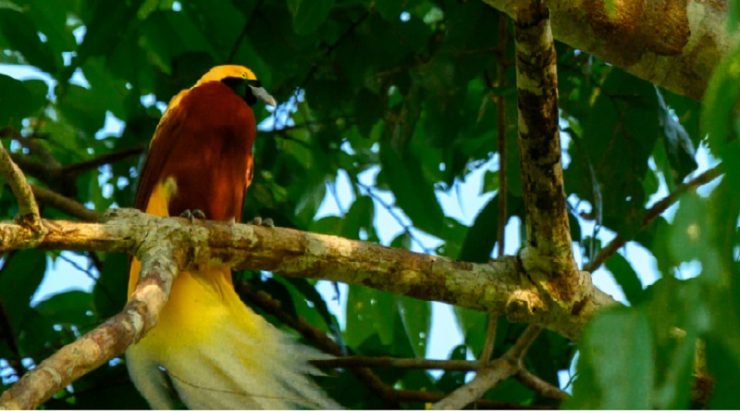BIRDWATCHING is a type of outdoor activity that is able to attract tourists, especially foreign tourists. The Tourism and Culture Service of Jayapura District, Papua, said that birdwatching or observing the Cenderawasih bird (also known as the bird of paradise), is a leading environmental-based tour that is popular with foreign tourists.
“Our leading tourist attraction is Birdwatching Isyo Hills in Rephang Muaif Village, Nimbokrang Sub-district,” the head of Jayapura Tourism and Culture Service, Ted Mokay, conveyed.
Birdwatching in the wild can be enjoyed with the naked eyes, using tools such as a telescope or binoculars, or simply listening to the sounds of birds. The leading tourist object in this area is environment-based tourism since it offers beautiful and diverse natural potential.
Visitors to Birdwatching Isyo Hills are dominated by foreign tourists and it has never been empty of visitors. As a form of support, the Jayapura Tourism Service helped to complete supporting infrastructure, such as the Cenderawasih bird viewing tower and lodging.
Birdwatching Isyo Hills is a customary forest with extraordinary biodiversity. This area is a habitat for at least six species of Cenderawasih birds. The World Wildlife Fund (WWF) Indonesia in the Papua region stated that Birdwatching Isyo Hills in Rhepang Muaif Village is included in the Indigenous and Community Conserved Area (ICCA).
“The involvement of indigenous peoples, women, and youth in managing ecotourism is a good collaboration for sustainable development to preserve biodiversity,” the WWF’s Papua Program Manager, Wika Rumbiak, disclosed.
The practice of protecting natural resources and the environment based on local wisdom and values based on community initiatives can be seen at the Birdwatching Isyo Hills.
Through the protection of indigenous peoples, sustainable funding, and development of the tourism sector, and the development of sustainable non-timber forest products, the focus of this program is to maintain the originality of natural forests.
The foundation’s Papua Program also continuously works with indigenous peoples, local governments, universities, and other development partners to protect biodiversity in the area, both flora and fauna.
Noken Park
In the near future, the Jayapura District Government would also build a Noken Park at Birdwatching Isyo Hills.
Acting head of Jayapura District Triwarno Purnomo said since Birdwatching Isyo Hills is very popular with foreign tourists, the regional government starts to pay attention to the tourist object.
According to Purnomo, Birdwatching Isyo Hills is a customary forest with extraordinary biodiversity. This area is known as a habitat for the Cenderawasih bird.
The local government also appreciates Alex Waisimon as the manager of Birdwatching Isyo Hills, who is a local indigenous people and has introduced Jayapura District tourism to the world.
Purnomo stated that as a form of support and attention from the government, a Noken Park will soon be built in the area. The existence of Cendrawasih bird monitoring post brings benefits to the economic growth of indigenous people and improves the forest environment.
Purnomo said that the government’s current focus is increasing community productivity through superior sectors owned by Jayapura District.
Nature School
Building a nature school is one of Alex Waisimon’s ideas. This idea has been started since 2015, and the school is slowly being built according to financial conditions. In addition, in 2020, the Isyo Hills group became a legal institution entity called the Yombe Yawa Datum Services Cooperative. In the Genyem language, Yombe means ours, while Yawa Datum means growing.
The existence of the cooperative is expected to become a jointly owned business that continues to grow and provide benefits for the people in the ecotourism environmental service business.As an effort to strengthen the cooperative and promote ecotourism activities in the area, the cooperative management continues the nature school initiative named the Yombe Yawa Datum Nature School.
One of the objectives of the nature school is to raise knowledge resources and product development to support ecotourism activities. Nature school is dedicated not only to people in Rhepang Muaif Village, but to everyone. Any Papuan may come and learn from the nature school.
Yombe Yawa Datum Nature School has now started running, equipped with a library and the implementation of teaching in three classes, namely Noken Class, English Class, and Namblong Language Class.
This school will later provide a lot of learning not only conventional learning but also insights about the environment, plants, animals, and others.
Regarding natural wealth, agriculture, living pharmacy, language, and culture education, the Yombe Yawa Datum Nature School invites many volunteers, including from the Cenderawasih University and the Earth Hour Papua Community to share their knowledge.
Until now, the WWF Indonesia Foundation is still working with the community in Rhepang Muaif Village. The globally networked foundation continues to encourage and develop community-based nature conservation in the region.
When the COVID-19 pandemic hit, the ecotourism business was one of the most affected sectors. Therefore, the local government through the Tourism Service has provided various assistance to the ecotourism business.
During the pandemic, the WWF Indonesia Foundation was also seeking public fundraising for the Rhepang Muaif community. These funds were then donated in the form of incentives for cultivating garden land and vegetable seeds and other plants.
Birdwatching Isyo Hills in Rhepang Muaif Village is a clear example that community persistence and collaboration can change an area that was once so degraded, to become an area that provides countless benefits to those who faithfully take care of it. [antaranews]
















